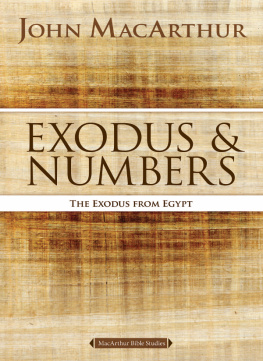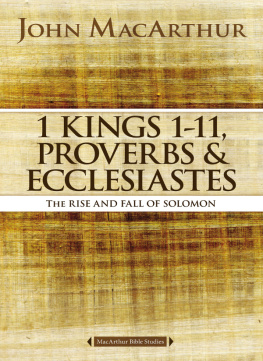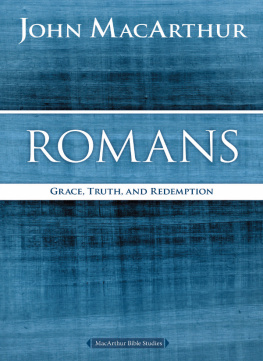MacArthur - The Truth About Grace
Here you can read online MacArthur - The Truth About Grace full text of the book (entire story) in english for free. Download pdf and epub, get meaning, cover and reviews about this ebook. City: Nashville, year: 2012, publisher: Thomas Nelson, genre: Religion. Description of the work, (preface) as well as reviews are available. Best literature library LitArk.com created for fans of good reading and offers a wide selection of genres:
Romance novel
Science fiction
Adventure
Detective
Science
History
Home and family
Prose
Art
Politics
Computer
Non-fiction
Religion
Business
Children
Humor
Choose a favorite category and find really read worthwhile books. Enjoy immersion in the world of imagination, feel the emotions of the characters or learn something new for yourself, make an fascinating discovery.
The Truth About Grace: summary, description and annotation
We offer to read an annotation, description, summary or preface (depends on what the author of the book "The Truth About Grace" wrote himself). If you haven't found the necessary information about the book — write in the comments, we will try to find it.
The Truth About Grace — read online for free the complete book (whole text) full work
Below is the text of the book, divided by pages. System saving the place of the last page read, allows you to conveniently read the book "The Truth About Grace" online for free, without having to search again every time where you left off. Put a bookmark, and you can go to the page where you finished reading at any time.
Font size:
Interval:
Bookmark:

THE TRUTH ABOUT
___________________
grace
THE TRUTH ABOUT
___________________
grace
John MacArthur

2012 by John MacArthur
All rights reserved. No portion of this book may be reproduced, stored in a retrieval system, or transmitted in any form or by any meanselectronic, mechanical, photocopy, recording, scanning, or otherexcept for brief quotations in critical reviews or articles, without the prior written permission of the publisher.
Published in Nashville, Tennessee, by Thomas Nelson. Thomas Nelson is a registered trademark of Thomas Nelson, Inc.
Thomas Nelson, Inc., titles may be purchased in bulk for educational, business, fund-raising, or sales promotional use. For information, please e-mail SpecialMarkets@ThomasNelson.com.
Unleashing Gods Truth, One Verse at a Time is a trademark of Grace to You. All rights reserved.
Compiled from previously published material in The God Who Loves, The Jesus You Cant Ignore, The Vanishing Conscience, Hard to Believe, The Truth War, and The Gospel According to the Apostles.
Unless otherwise indicated, Scripture quotations are taken from THE NEW KING JAMES VERSION. 1982 by Thomas Nelson, Inc. Used by permission. All rights reserved.
Scripture quotations marked NIV are taken from the Holy Bible, New International Version, NIV. Copyright 1973, 1978, 1984 by Biblica, Inc. Used by permission of Zondervan. All rights reserved worldwide. www.zondervan.com
Scripture quotations marked NASB are taken from the NEW AMERICAN STANDARD BIBLE. The Lockman Foundation 1960, 1962, 1963, 1968, 1971, 1972, 1973, 1975, 1977, 1995. Used by permission.
Scripture quotations marked KJV are taken from the King James Version.
Library of Congress Cataloging-in-Publication Data
MacArthur, John, 1939
The truth about grace / John MacArthur.
p. cm.
Includes bibliographical references (p. ).
ISBN 978-1-4002-0412-0
1. Grace (Theology) I. Title.
BT761.3.M27 2012
234dc23
Printed in the United States of America
12 13 14 15 16 QG 6 5 4 3 2 1
CONTENTS
CHAPTER 1
G RACE DEFINED
WHAT IS GRACE?
Defining grace succinctly is notoriously difficult. Some of the most detailed theology textbooks do not offer any concise definition of the term. Someone has proposed an acronym: GRACE is Gods Riches At Christs Expense. Thats not a bad way to characterize grace, but it is not a sufficient theological definition. One of the best-known definitions of grace is only three words: Gods unmerited favor. A. W. Tozer expanded on that: Grace is the good pleasure of God that inclines him to bestow benefits on the undeserving.
At the heart of the term grace is the idea of divine favor. The Hebrew word for grace is chen, used, for example, in Genesis 6:8: Noah found favor in the eyes of the LORD (NASB). Closely related is the verb chanan, meaning to show favor. In the New Testament, grace is a rendering of the Greek charis, meaning gracefulness, graciousness, favor, or gratitude. Intrinsic to its meaning are the ideas of favor, goodness, and goodwill.
Grace is all that and more. Grace is not merely unmerited favor; it is favor bestowed on sinners who deserve wrath. Showing kindness to a stranger is unmerited favor; doing good to ones enemies is more the spirit of grace (Luke 6:2736). Grace is not a dormant or abstract quality, but a dynamic, active, working principle: The grace of God has appeared, bringing salvation... and instructing us (Titus 2:1112 NASB). It is not some kind of ethereal blessing that lies idle until we appropriate it. Grace is Gods sovereign initiative to sinners (Ephesians 1:56). Grace is not a one-time event in the Christian experience. We stand in grace (Romans 5:2). The entire Christian life is driven and empowered by grace: It is good for the heart to be strengthened by grace, not by foods (Hebrews 13:9 NASB). Peter said we should grow in the grace and knowledge of our Lord and Savior Jesus Christ (2 Peter 3:18).
Thus we could properly define grace as the free and benevolent influence of a holy God operating sovereignly in the lives of undeserving sinners.
Graciousness is an attribute of God. It is His nature to bestow grace. He is gracious and compassionate and righteous (Psalm 112:4 NASB). He is gracious and compassionate, slow to anger, abounding in lovingkindness, and relenting of evil (Joel 2:13 NASB). He is the God of all grace (1 Peter 5:10); His Son is full of grace and truth (John 1:14); His Spirit is the Spirit of grace (Hebrews 10:29). Berkhof observed, While we sometimes speak of grace as an inherent quality, it is in reality the active communication of divine blessings by the inworking of the Holy Spirit, out of the fullness of Him who is full of grace and truth.
Charis is found in the Greek text 155 times, 100 times in the Pauline epistles alone. Interestingly, the term itself is never used in reference to divine grace in any of the recorded words of Jesus. But grace permeated all His ministry and teaching (The blind receive sight and the lame walk, the lepers are cleansed and the deaf hear, and the dead are raised up, and the poor have the gospel preached to them [Matthew 11:5 NASB]; Come to Me, all who are weary and heavy-laden, and I will give you rest [Matthew 11:28 NASB]). Grace is a gift. God gives more grace.... [He] gives grace to the humble (James 4:6). Of His fullness we have all received, and grace for grace (John 1:16). Christians are said to be stewards of the manifold grace of God (1 Peter 4:10). But that does not mean that Gods grace is placed at our disposal. We do not possess Gods grace or control its operation. We are subject to grace, never vice versa.
Paul frequently contrasted grace with law (Romans 4:16; 5:20; 6:1415; Galatians 2:21; 5:4). He was careful to state, however, that grace does not nullify the moral demands of Gods law. Rather, it fulfills the righteousness of the law (Romans 6:1415). In a sense, grace is to law what miracles are to nature. It rises above and accomplishes what law cannot (Romans 8:3). Yet it does not annul the righteous demands of the law; it confirms and validates them (Romans 3:31). Grace has its own law, a higher, liberating law: the law of the Spirit of life in Christ Jesus has set you free from the law of sin and death (Romans 8:2; James 1:25). Note that this new law emancipates us from sin as well as death. Paul was explicit about this: What shall we say then? Are we to continue in sin that grace might increase? May it never be! How shall we who died to sin still live in it? (Romans 6:12 NASB). Grace reigns through righteousness (Romans 5:21).
TWO KINDS OF GRACE
Common Grace
Theologians speak of common grace and special grace.
Common grace is a term theologians use to describe the goodness of God to all mankind universally. Common grace restrains sin and the effects of sin on the human race. Common grace is what keeps humanity from descending into the morass of evil that we would see if the full expression of our fallen nature were allowed to have free reign.
Scripture teaches that we are totally depraved tainted with sin in every aspect of our being (Romans 3:1018). People who doubt this doctrine often ask, How can people who are supposedly totally depraved enjoy beauty, have a sense of right and wrong, know the pangs of a wounded conscience, or produce great works of art and literature? Arent these accomplishments of humanity proof that the human race is essentially good? Dont these things testify to the basic goodness of human nature?
Next pageFont size:
Interval:
Bookmark:
Similar books «The Truth About Grace»
Look at similar books to The Truth About Grace. We have selected literature similar in name and meaning in the hope of providing readers with more options to find new, interesting, not yet read works.
Discussion, reviews of the book The Truth About Grace and just readers' own opinions. Leave your comments, write what you think about the work, its meaning or the main characters. Specify what exactly you liked and what you didn't like, and why you think so.

















